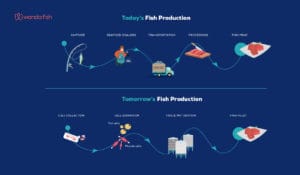
Israeli start-up to accelerate production of cell-cultivated fish with David Kaplan, PhD, a leading researcher in cellular agriculture
Nes-Ziona, Israel- FoodTech start-up Wanda Fish Technologies, Ltd. has signed two agreements with Tufts University to advance the company’s goals in the emerging field of cultivated fish. Under a licensing agreement, Wanda Fish gains exclusive rights to certain intellectual property in fish cell cultivation developed by Tufts researcher David Kaplan, a leader in the field of cellular agriculture. Additionally, a two-year sponsored research agreement with the university supports Kaplan’s research into cellular agriculture-based production of fish tissue. Taken together, the moves will significantly propel Wanda Fish’s strategies for producing sustainable, tasty, cultivated fish fillets.
Approximately 20% of the protein currently consumed by the global population emanates from the ocean. As a highly satiating, nutritionally dense food source, the appetite for seafood, and especially fish, is only projected to keep growing. This is putting increasing strain on the existing seafood industry to keep up, not to mention already overfished waterways.
“More than three billion people depend on the ocean and its surroundings for their living,” stresses Dr. Daphna Heffetz, CEO of Wanda Fish. “Marine biodiversity is critical to the survival of people and our planet. Overfishing, as well as water pollution, is damaging the vast and vital ocean ecosystem. Many wild fish populations are sadly in decline.” Heffetz brings more than 20 years of experience in establishing and growing biotechnological companies.
Producing seafood from fish cells is a niche within the alt protein scene that is rapidly gaining ground in the collective quest to address the challenges of the seafood industry. Wanda Fish was formed last year with financial and technical support from the Israeli Innovation Authority (IIA) and in conjunction with the The Kitchen FoodTech Hub. Wanda Fish already secured USD 3M in its pre-seed funding round led by The Strauss Group’s, The Kitchen FoodTech Hub. It has also gained investments from Peregrine Ventures, Pico Partners, CPT Capital, and MOREVC.
Wanda’s development team in Israel is led by R&D Director Malkiel Cohen, Ph.D., a respected expert in stem cells and genome engineering for the biomedical and AagTech fields.
To create a top-notch multidisciplinary R&D team, the team turned to Kaplan, the Stern Family Endowed Professor of Engineering at Tufts University, a distinguished University Professor, and Professor and Chair of the Department of Biomedical Engineering. A well-known expert in biopolymer engineering, Kaplan is also a leading academic authority on cultivated meat, having recently received a USD 10M grant from the U.S. Department of Agriculture to establish the first national center in the US dedicated to research in cellular agriculture.
Closest isn’t close enough
Using R&D facilities in the US and Israel, Wanda Fish is establishing a proprietary, GMO-free platform for producing cell-based finless fish fillets of varying species, without placing any burden on the ocean and the lifeforce within it. “We start with a single, one-time sample of a real native fish muscle and fat tissues,” explains Kaplan. “We then pursue the replication of the biological growth of fish, with the nutritional attributes, including protein and omega 3 content, as well as the flavor and textural properties. The results are clean, safe fish free of microplastics, mercury, or other chemical toxicities that are commonly found in some of the wild catch.”
Heffetz reveals the team have already made some headway in developing its first prototype of a fish fillet directly from fish cells. “Our platform includes animal-free growing medium, know-how in producing native muscle and fat tissues and specially customized bioreactors that will give us the capacity to scale up production and eventually bring our cultured fish products to cost parity with conventionally fished counterparts,” states Heffetz. “By integrating innovative proprietary applications from multiple disciplines, including cell culture, biotechnology, food tech, and culinary design, we will produce a versatile range of fish species to satisfy all preferences, at affordable prices, and with uncompromising quality.”
“Having nurtured already a successful venture in meat cultivation, Wanda Fish cements our dominant position within the relatively nascent cellular agriculture category,” enthuses Jonathan Berger, CEO of The Kitchen FoodTech Hub. “With Increasing acidification, pollution, and warming of our oceans, a growing global population, and the concurrent dwindling of the sea biomass and its fish populations, the need to rehabilitate the sea and sea life has never been more pressing. Wanda Fish offers a new approach to meeting the increasing global demand for nutritious seafood without harming aquatic life. With cultivated fish, the world can eat the fish it craves while giving the ocean and its ecosystems space to heal.”


